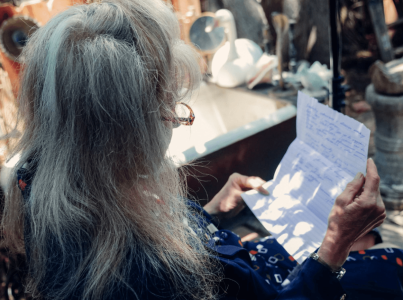‘Hi Mum’ scam claims another victim: Victorian mum left devastated after losing $11,000
- Replies 38
Beware! Scammers are no longer just using old tricks to defraud unsuspecting victims of their hard-earned money. They have become more cunning and deceptive in their ways, making it even harder to identify their ploys.
One of their latest scams involves preying on the emotions of older Australians by impersonating their family members and tricking them into transferring large sums of money.
Recently, a mum from Victoria was left devastated after losing a staggering $11,000 to these fraudsters.
Can you imagine falling victim to such a cruel trick and losing such a significant amount of money? It can happen to anyone, and that's what makes this scam so dangerous.

Nina Merrilees, the victim, shared how she was deceived into sending money to the scammers, thinking it was her daughter in need. The message came via WhatsApp, and it appeared to be a genuine message from her daughter, who was supposedly using a new phone number.
The message said: 'Hi Mum, my phone is broken, this is my new number.'
This scenario was not out of the ordinary for Merrilees, as her daughter had lost or broken her phone before and had to get a new number. So she thought nothing of it when she received the message.
After the initial message, the scammers sent another message, asking for help with urgent payments. Merrilees, thinking that she was helping her daughter, agreed to provide the assistance, as it was not unusual for her to make payments for her children.
To make the scam more convincing, the fraudsters even added emojis like love hearts and smiley faces to make the messages seem more genuine. After some time, the mum sent a series of payments using Osko, totalling $11,000.

The aftermath of falling for a scam can be emotionally and financially devastating, as Merrilees found out. After making several payments, she began to feel uneasy and decided to email her daughter, only to be contacted almost immediately by her daughter's old number.
It was then that she realised she had fallen prey to a scam, and the sinking feeling of losing her hard-earned money overwhelmed her. 'I felt physically sick,' she said.
Despite seeking assistance from her bank and the police, recovering the lost money has yet to be successful.

It's disheartening to hear that Nina Merrilees' experience is not an isolated incident. According to a recent report by the Australian Competition and Consumer Commission (ACCC), Australians lost a staggering $1.8 billion to scams in 2021, which is a record high.
The report, which is based on an analysis of over 560,000 reports and data from Scamwatch, ReportCyber, major banks, and money remitters, estimates that the actual losses are much higher than the reported amount.
Furthermore, the ACCC has received over 9,700 reports of 'Hi Mum' scams in 2022, totalling losses of nearly $7.2 million. It's a concerning trend that shows no sign of slowing down.
To make matters worse, scammers are now using alpha tags (a name or a string of text that appears in place of a phone number as the sender ID), making it even more difficult to identify a scam. In this new variant of the scam, the message appears to be from a genuine family member, complete with the contact details and all, making it harder to detect.

This experience is a reminder that scammers are constantly devising new and sophisticated ways to deceive and manipulate their victims.
It's crucial to be vigilant and cautious, especially when it comes to unsolicited requests for money, even if they seem to come from a trusted source. Always double-check with the person directly, preferably through a different communication channel, and never rush into making a payment.
If you're ever looking for the latest information on scams and other similar incidents, the Scam Watch forum on the SDC website is the place to go! Make sure to check it out and stay informed.
Members, do you have any other tips for avoiding scams like this? Or have you ever gone through a similar experience? Share your stories and any experiences you have in the comments below!
One of their latest scams involves preying on the emotions of older Australians by impersonating their family members and tricking them into transferring large sums of money.
Recently, a mum from Victoria was left devastated after losing a staggering $11,000 to these fraudsters.
Can you imagine falling victim to such a cruel trick and losing such a significant amount of money? It can happen to anyone, and that's what makes this scam so dangerous.

Merrilees had been busy at work when she received a WhatsApp message that said, 'Hi Mum, my phone is broken, this is my new number'. Credit: Unsplash/freestocks.
Nina Merrilees, the victim, shared how she was deceived into sending money to the scammers, thinking it was her daughter in need. The message came via WhatsApp, and it appeared to be a genuine message from her daughter, who was supposedly using a new phone number.
The message said: 'Hi Mum, my phone is broken, this is my new number.'
This scenario was not out of the ordinary for Merrilees, as her daughter had lost or broken her phone before and had to get a new number. So she thought nothing of it when she received the message.
After the initial message, the scammers sent another message, asking for help with urgent payments. Merrilees, thinking that she was helping her daughter, agreed to provide the assistance, as it was not unusual for her to make payments for her children.
To make the scam more convincing, the fraudsters even added emojis like love hearts and smiley faces to make the messages seem more genuine. After some time, the mum sent a series of payments using Osko, totalling $11,000.

It was only when Merrilees emailed her daughter afterwards that she realised the horrifying truth. Credit: Kindel Media.
The aftermath of falling for a scam can be emotionally and financially devastating, as Merrilees found out. After making several payments, she began to feel uneasy and decided to email her daughter, only to be contacted almost immediately by her daughter's old number.
It was then that she realised she had fallen prey to a scam, and the sinking feeling of losing her hard-earned money overwhelmed her. 'I felt physically sick,' she said.
Despite seeking assistance from her bank and the police, recovering the lost money has yet to be successful.
Key Takeaways
- A Victorian mum lost $11,000 after falling victim to the 'Hi Mum' scam.
- The scam involves receiving a text message claiming to be from a family member, asking to borrow money and providing bank account details for the transfer.
- In this particular case, the scammers pretended to be the victim's daughter, who lives in New Zealand, requesting help making payments due to a broken phone.
It's disheartening to hear that Nina Merrilees' experience is not an isolated incident. According to a recent report by the Australian Competition and Consumer Commission (ACCC), Australians lost a staggering $1.8 billion to scams in 2021, which is a record high.
The report, which is based on an analysis of over 560,000 reports and data from Scamwatch, ReportCyber, major banks, and money remitters, estimates that the actual losses are much higher than the reported amount.
Furthermore, the ACCC has received over 9,700 reports of 'Hi Mum' scams in 2022, totalling losses of nearly $7.2 million. It's a concerning trend that shows no sign of slowing down.
To make matters worse, scammers are now using alpha tags (a name or a string of text that appears in place of a phone number as the sender ID), making it even more difficult to identify a scam. In this new variant of the scam, the message appears to be from a genuine family member, complete with the contact details and all, making it harder to detect.

It's important for us to be aware of such scams and to always be wary of who we are sending money to. Credit: Unsplash/ROBIN WORRALL.
This experience is a reminder that scammers are constantly devising new and sophisticated ways to deceive and manipulate their victims.
It's crucial to be vigilant and cautious, especially when it comes to unsolicited requests for money, even if they seem to come from a trusted source. Always double-check with the person directly, preferably through a different communication channel, and never rush into making a payment.
If you're ever looking for the latest information on scams and other similar incidents, the Scam Watch forum on the SDC website is the place to go! Make sure to check it out and stay informed.
Members, do you have any other tips for avoiding scams like this? Or have you ever gone through a similar experience? Share your stories and any experiences you have in the comments below!







